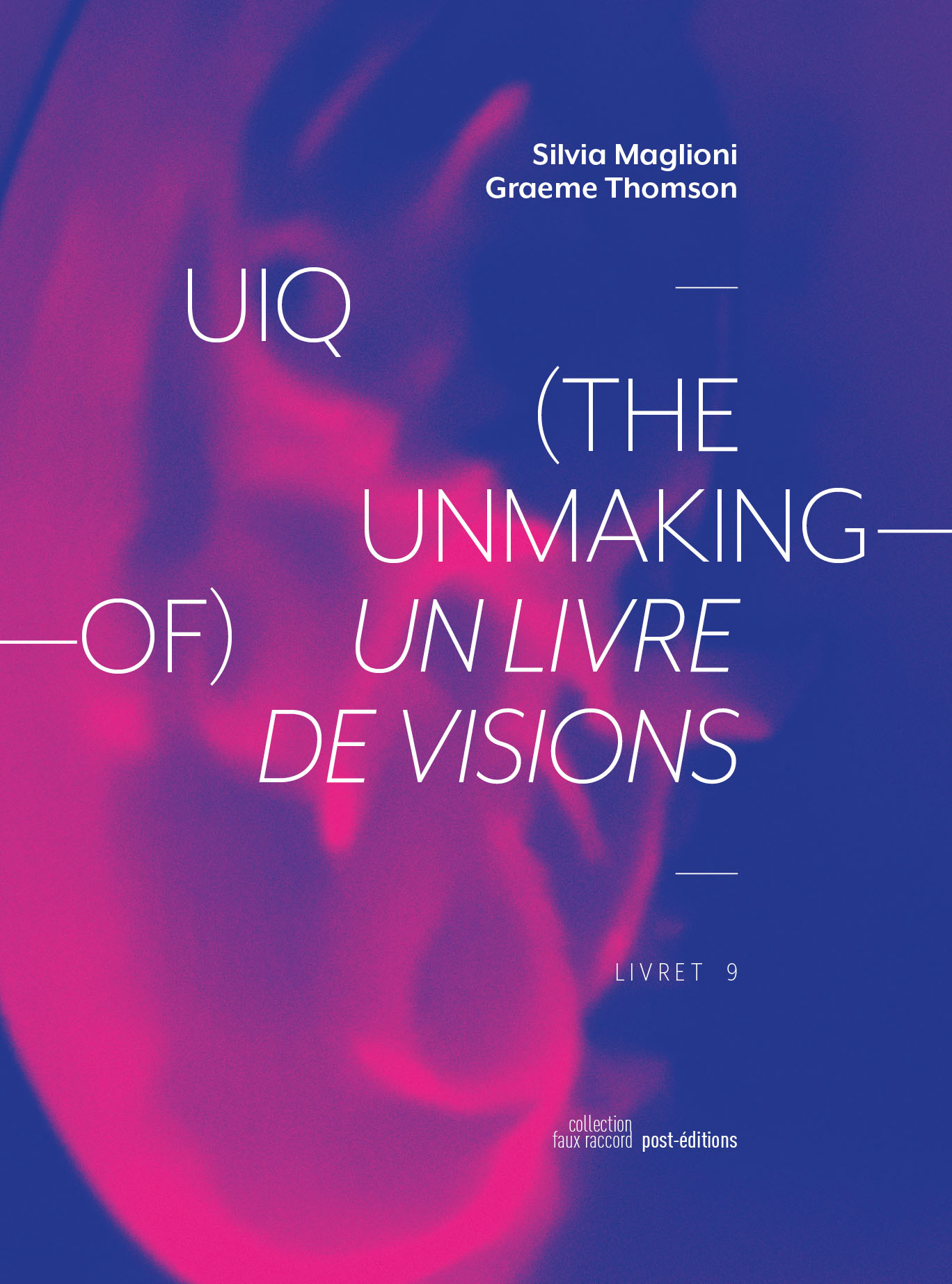Présentation en français (English below)
UIQ (the unmaking-of) – Un livre de visions appartient à la constellation des formes artistiques conçues par Silvia Maglioni et Graeme Thomson à partir du scénario de Félix Guattari, Un amour d’UIQ : un projet de science-fiction qui raconte l’histoire de la rencontre entre un groupe de squatteurs et UIQ, l’Univers Infra-Quark, une intelligence « aliène » dont la forme, l’étendue, le genre ou le langage restent indéterminés ou à définir.
Après avoir retrouvé le scénario de Guattari dans les archives de l’IMEC, Silvia Maglioni et Graeme Thomson entament un travail de traduction et de transduction pour multiplier les formes de manifestations possibles du film et de son univers. La nécessité de visualiser cet univers ne les amènera pas à réaliser le film, mais plutôt, à organiser des séances collectives ou des ateliers de partage des visions suscitées par la lecture du scénario. L’enregistrement de ces séances est à l’origine de la pièce sonore électroacoustique intitulée UIQ (the unmaking-of). Elle constitue, aujourd’hui, le cœur de UIQ (the unmaking-of) – Un livre de visions puisque l’écriture et la conception du livre découlent de la transcription graphique de la pièce sonore.
Par le retour à la lecture, il s’agirait de perpétuer cette opération de contamination, le livre se laissant envahir par toutes les disséminations d’une écriture de l’oralité et par la capacité de UIQ à ouvrir toute forme qui pourrait être close sur elle-même. Si le livre est issu d’un processus de traduction, il se fait aussi partition dans le sens où tout lecteur est invité à se faire l’interprète d’une œuvre qui fait émerger et offre en partage les images d’autres conditions politiques de l’existence.
La traduction est le principe moteur du livre : autant de transferts ou de points de passage – dont on finit par ne plus savoir ce qui est premier – d’une langue à l’autre, de l’écriture sonore vers le texte, mais également de l’énoncé théorique vers le langage littéraire. « Notes sur le cinéma potentiel » reprennent sous la forme d’une écriture fragmentaire la réflexion engagée depuis l’édition du scénario de Félix Guattari jusqu’aux développements les plus récents de ce travail qui mène à l’élaboration et à l’activation d’un jeu que les artistes nomment « Dark Matter Cinema Tarot ». L’ensemble composite du livre, UIQ (the unmaking-of) – Un livre de visions constitue un essai poétique qui rend active une circulation entre différentes pratiques artistiques et entre différents langages, restituant ainsi, pour tout lecteur, l’univers en puissance de UIQ, issu de la non-réalisation du scénario de Félix Guattari.
* UIQ (the unmaking-of) est à écouter sur le CD fourni avec le livre.
English presentation
UIQ (the unmaking-of) – A Book of Visions is part of a constellation of artistic forms conceived by Silvia Maglioni and Graeme Thomson beginning from Félix Guattari’s screenplay, A Love of UIQ : an unrealised project for a science-fiction film which recounts the encounter between a group of squatters and UIQ, the Infra-Quark Universe, an alien intelligence whose form, spatial and temporal extension, gender and language remain indeterminate or else await definition.
After uncovering the screenplay in Guattari’s archives at IMEC, Silvia Maglioni and Graeme Thomson began a work of translation and transduction as a way of multiplying the forms by which the film and its universe could be made manifest. In the end, rather than making Guattari’s film, the need to visualise its universe led them to organise a series of collective sessions or workshops for the sharing of visions suggested by collective readings of the screenplay. The recording of these sessions led in turn to an electro-acoustic soundwork entitled UIQ (the unmaking-of) that constitutes the core of UIQ (the unmaking-of) – A Book of Visions, the conception and writing of which arise from a graphic transcription of the piece.
By returning to the act of reading, the idea is to perpetuate this work of contamination, the book itself being permeated by the written trace of these oral visions and by UIQ’s own capacity to hack even the most hermetically sealed forms. If the book issues in part from a process of translation, this too constitutes a score, inviting the reader to become interpreter of a work that summons and commons visions of alternative life worlds.
Translation is the book’s very engine : in its endless relays from one language to another – the sonic to the textual, the theoretical to the literary – in which we no longer know which comes first. The fragmentary form of « Notes on Potential Cinema », meanwhile, takes up an arc of reflection that stretches from the publication of Guattari’s screenplay to the artists’ recent conception and activation of the Dark Matter Cinema Tarot. Taken as a whole, UIQ (the unmaking-of) – A Book of Visions constitutes a poetic essay that moves between different languages and art practices, unveiling for the reader the universe and powers of UIQ, fruit of the unmaking of Félix Guattari’s unmade screenplay.
*UIQ (the unmaking-of) can be heard on the CD included with the book.
http://cargocollective.com/terminal-beach
Ouvrage de la collection "faux raccord" dirigée par Judith Abensour et Thomas Bauer. Publié avec le soutien à l’édition du Centre national des arts plastiques.



